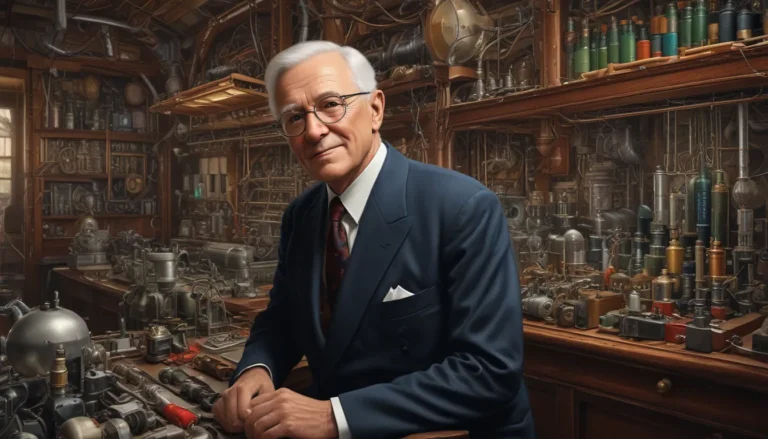The images in our articles may not match the content exactly. They are used to grab your attention, not to show the exact details in the text. The images complement the text but do not replace it.
Immanuel Kant, a legendary figure in the realm of philosophy, is celebrated for his profound contributions to metaphysics, epistemology, and ethics. Born in 18th-century Prussia, Kant’s intellectual prowess continues to influence our understanding of the world and our place within it. In this enlightening article, we will embark on a journey through 20 captivating facts about Immanuel Kant, shedding light on his life, work, and enduring legacy. From his groundbreaking concept of the categorical imperative to his belief in the limits of human knowledge, Kant’s ideas have sculpted the landscape of philosophy and remain a subject of study and debate among scholars and thinkers today. Join us as we unravel the life and philosophies of Immanuel Kant, one of history’s most prominent philosophers.
Unraveling the Essence of Kant:
- Immanuel Kant, a renowned philosopher, emphasized reason, morality, and autonomy in his influential works, shaping our understanding of the world and ourselves.
- Kant’s concept of transcendental idealism, categorical imperative, and intrinsic human dignity continue to influence philosophy, ethics, and human rights discussions today.
The Beginning of a Legacy:
Immanuel Kant was born on April 22, 1724, in Königsberg, Prussia, now known as Kaliningrad, Russia. His birthplace played a pivotal role in shaping his philosophical ideologies and thought processes.
A Trailblazer in Philosophy:
Kant is widely recognized as one of the most influential figures in Western philosophy. His seminal work, the “Critique of Pure Reason,” has left an indelible mark on the realms of philosophy, epistemology, and ethics, resonating through the corridors of intellectual discourse till date.
The Concept of Transcendental Idealism:
In his magnum opus, the “Critique of Pure Reason,” Kant introduced the concept of transcendental idealism, delving into the intricate interplay between the mind and the external world. He posited that our knowledge is molded by our perceptions and cognitive faculties, revolutionizing philosophical thought.
Championing Moral Duty:
Central to Kant’s ethical framework was the development of the categorical imperative, a moral principle advocating that actions should be rooted in universalizable principles. This underlined his belief in the significance of moral duty.
A Legacy of Influence:
Kant’s profound philosophical musings resonated far beyond his era, inspiring a cadre of eminent philosophers and intellectuals including Arthur Schopenhauer, Friedrich Nietzsche, and John Stuart Mill.
The Primacy of Reason:
Immanuel Kant underscored the pivotal role of reason and rationality in comprehending the intricacies of the world and making ethical judgments. He extolled reason as the bedrock of moral actions and human autonomy.
Bridging Rationalism and Empiricism:
Kant endeavored to reconcile the dichotomy between rationalism and empiricism, contending that a holistic understanding of reality necessitated the amalgamation of rational thought and empirical evidence.
Precision in Thought and Language:
Known for his intricate writing style, particularly evident in the “Critique of Pure Reason,” Kant meticulously crafted his ideas with precision and complexity, necessitating a meticulous analysis and interpretation.
Embracing Enlightenment Ideals:
Emmanuel Kant ardently supported the Enlightenment movement, advocating for reason, individualism, and progress. He believed that through reason, humanity could transcend ignorance and embark on a journey of self-improvement.
A Beacon in Ethics:
Kant’s ethical precepts, notably his elucidation of the categorical imperative, have cast a lasting impact on moral philosophy, instigating debates and shaping discussions on ethics and moral accountability.
A Doctrine of Intrinsic Human Dignity:
Kant vehemently argued for the existence of intrinsic human dignity, positing that every individual possessed inherent worth by virtue of their rationality. This principle became a cornerstone in the discourse surrounding human rights.
Upholding Autonomy:
Embracing the concept of autonomy, Kant championed the notion that individuals possess the capacity for self-governance and should not be subject to arbitrary authority. He championed the sanctity of human autonomy and individual freedom.
The Dichotomy of Noumena and Phenomena:
Kant drew a clear distinction between noumena, the “things-in-themselves,” and phenomena, the perceived appearances of those entities. He contended that human knowledge was confined to the realm of phenomena, precluding true comprehension of the noumenal realm.
Revolutionizing Epistemology:
Kant’s groundbreaking exploration of the nature and confines of knowledge in the “Critique of Pure Reason” redefined epistemology, challenging traditional perspectives on reason and perception.
A Controversial Reception:
Upon the release of his seminal works, Kant’s ideas elicited mixed reactions, with some extolling him as a genius while others critiqued the complexity and opacity of his theories.
Morality Rooted in Reason:
Kant posited that moral principles were not a product of subjective sentiments but derived from the rationality of moral agents. He expounded the universality of moral precepts accessible through reason.
A Multifaceted Influence:
Kant’s intellectual oeuvre transcended the boundaries of philosophy, permeating into disciplines such as psychology, sociology, and political science. His notions of autonomy and moral duty have left an indelible mark on these domains.
Enduring Scholarly Scrutiny:
Even centuries posthumously, Immanuel Kant’s philosophies remain under rigorous scholarly examination and debate. His writings persist as essential readings for aficionados of philosophy and intellectual history.
Treating Individuals as Ends in Themselves:
Kant fervently advocated for treating individuals not as mere means to an end but as autonomous entities imbued with inherent worth. This principle has significantly influenced ethical theories and human rights dialogues.
A Culmination in Religion and Morality:
In his final work, “Religion Within the Boundaries of Mere Reason,” Kant delved into the intricate nexus between religion and ethics, endeavoring to reconcile religious doctrines with rational and ethical principles.
Immanuel Kant’s intellectual legacy endures as a beacon of philosophical inquiry, casting a profound shadow on our understanding of ethics, metaphysics, and epistemology. His theories on reason, morality, and the nature of knowledge continue to captivate scholars and thinkers, elucidating profound insights into the fabric of reality.
Unveiling Immanuel Kant’s Philosophical Tapestry
The intricate web of Immanuel Kant’s philosophical tenets offers a rich tapestry of intellectual exploration, inviting us to delve deeper into the complexities of reason, morality, and existential inquiry. Through Kant’s lens, we gain unique perspectives on the eternal questions that have long intrigued humanity.
FAQs
- Who was Immanuel Kant?
Immanuel Kant was an eminent 18th-century German philosopher revered for his seminal contributions to ethics, metaphysics, and epistemology. - What are Kant’s major contributions to philosophy?
Kant’s major contributions encompass his ethical doctrines rooted in the categorical imperative, his distinction between phenomena and noumena, and his critical philosophy that laid the groundwork for contemporary philosophical discourse. - What is the categorical imperative?
The categorical imperative, propounded by Kant, posits that individuals should act based on principles that could be universally applied, transcending individual desires. - What is Kant’s distinction between phenomena and noumena?
According to Kant, phenomena denote the appearances of objects as perceived through human senses, while noumena represent the intrinsic nature of those objects beyond human perception. - How did Kant’s philosophy influence modern thinking?
Kant’s philosophical musings wielded a profound impact on modern thought, reshaping ethical, epistemological, and metaphysical discourses that resonate through contemporary intellectual landscapes.
Immanuel Kant’s philosophical legacy stands as a testament to the profundity of human inquiry and the enduring quest for truth and moral rectitude. Delve into the intellectual expanse of Kant’s philosophies to unravel the mysteries of reason, morality, and the enigmatic fabric of reality.






